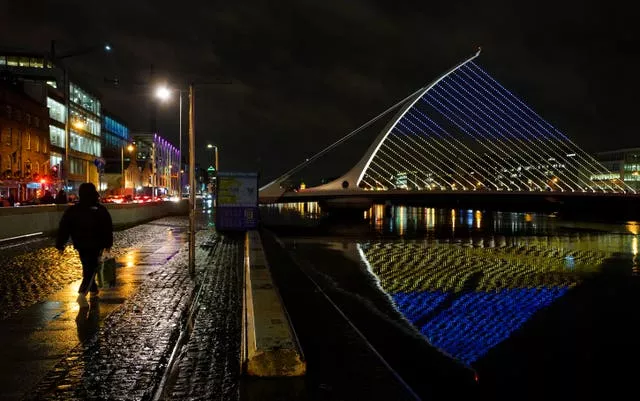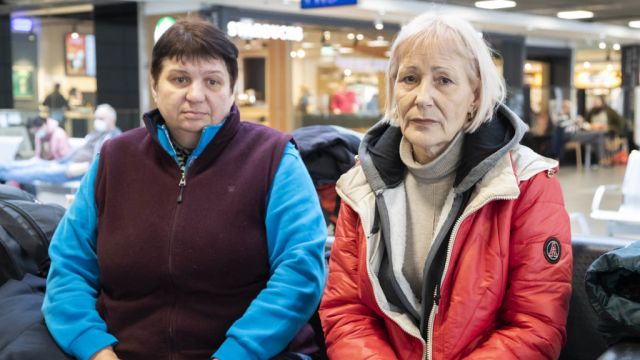The Minister for Integration has defended his department’s handling of the Ukrainian refugee crisis, saying he is confident it can cope with the rising number of people seeking accommodation.
The number of arrivals from Ukraine is expected to reach 70,000 over the next five weeks.
Minister for Children Roderic O’Gorman and Minister for Housing Darragh O’Brien launched a new campaign to appeal to the public to offer vacant homes or buildings for Ukrainians.
Mr O’Gorman said the Government has learned from mistakes following the first appeal.
Citizens had been asked earlier this year to pledge unused houses, apartments or holiday homes to house arriving Ukrainian refugees, but this was stalled as people reported delays with the system.
There are currently 59,000 Ukrainians in Ireland, with the State providing accommodation for some 47,000.
🇺🇦 🇮🇪 The Government has launched a new https://t.co/TSvGiTlebc campaign to take offers of vacant homes for Ukrainians. 🏠
We are appealing to anybody who has an empty house, apartment, or holiday home to consider offering it to those who need shelter and safety from war.— Roderic O’Gorman TD (@rodericogorman) November 24, 2022
Accommodation is being provided through hotels, guesthouses and pledged accommodation.
There are about 5,500 Ukrainians staying in accommodation offered by members of the public.
Offers will be made through the website, OfferAHome.ie which will go directly to local authorities.
Local authorities will make an assessment of the offers and make contact with people within five working days.
Mr O’Gorman, whose department is overseeing the response to housing, said there are currently 150 people in the Department of Children working on the Ukraine response.
He said he will need a further 50 staff as the number of people seeking refuge increases.
The minister also said there was an issue in paying some hotels for accommodating Ukrainians.
“There was a backlog of payments, we have made resources in there and we would hope to have all that backlog cleared in the next two weeks,” he added.
Mr O’Gorman also addressed the protests held in East Wall in Dublin over refugees being housed in a former ESB office block.
Protesters and some residents claimed there was not enough consultation with locals ahead of the arrangement.
Mr O’Gorman said there is “absolutely” a need to provide information to local communities when the department is providing accommodation.
“It’s important to say that we have a moral and legal obligation to provide shelter for those fleeing a wartime situation and that is requiring us to act quickly, and the alternative option is to leave people without homes,” Mr O’Gorman added.
“We do have to act quickly. This is a crisis. This is a wartime situation.
“We are looking to enhance our capacity to get information out to communities but it is important that in Ireland no-one has a veto in terms of who lives in their neighbourhood and in the community.”
“Today is a significant step in continuing to look to source accommodation for Ukrainian displaced people in our country,” he added.
Mr O’Brien said they are seeking offers for a minimum of six months.
“This scheme is calling on members of the public who may have an unoccupied home, such as holiday home they are not using at the moment, that could be made available to accommodate our friends in Ukraine,” Mr O’Brien said on Thursday.
“Ideally, we are looking for that home for a minimum of six months.
“It is more likely we will see more people seeking refuge here.
“The State and our people responded in an incredible way to the desperate humanitarian tragedy that is happening in Europe.
“We’ve had learnings from that process too, so from now we are able to streamline those offers of homes.”
Mr O’Gorman emphasised that those who pledge this accommodation would get the 800 euro per month recognition payment.
Meanwhile, the Economic and Social Research Institute (ESRI) has found an increase in international protection applicants to Ireland in 2022 has been caused by a confluence of factors.

Ireland is among the few EU countries that saw asylum seeker applicants rise continuously throughout the first six months of 2022.
In the first half of this year, there have been 6,494 international protection applicants to Ireland – a “significant” increase from 2,235 applicants in the first half of 2019.
The ESRI research, funded by Mr O’Gorman’s department, found that a sharp jump in applications from February 2022 could be a form of “catch-up migration”.
It also found that although Ukrainian nationals were not included in this cohort examined, that the Russian invasion has caused “significant displacement” with knock-on effects in neighbouring countries.
The study also noted that conditions and conflict in countries of origin are “significant factors” in the recent increase.
“The research identifies that for many of the top nationalities applying for international protection in Ireland (including Somali, Afghan, Ukrainian, Egyptian and Georgian), conditions and conflict in countries of origin are important drivers.
“Applications from these nationalities are increasing not only in Ireland, but across Europe,” it said.
It also said that policy changes in the UK were “unlikely” to have had a significant effect on recent application figures in Ireland.

This is in reference to the suggestion by Mr O’Gorman and Taoiseach Micheal Martin that the UK’s controversial policy to send migrants to Rwanda was leading to a spike in applications in Ireland.
The ESRI report notes: “However, there may be a small deflection effect for certain nationalities (eg, South African and Zimbabwean), whereby instead of going to the UK, applicants come to Ireland.
“The UK is also seeing a significant rise in applications, and, while Ireland may be affected by some of this increase, the UK’s increase is driven by different nationalities,” it said.







